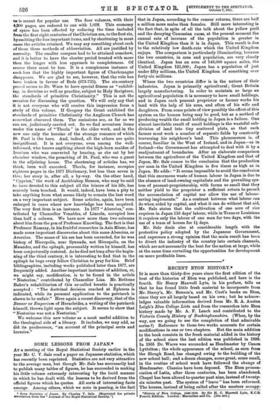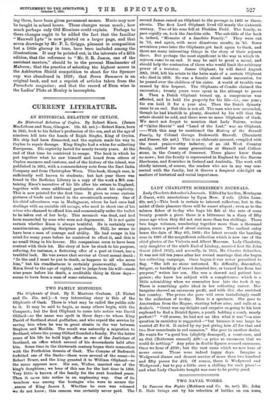RECENT ETON HISTORY.*
IT is more than thirty-five years since the first edition of the best of the histories of Eton was published, and here is the fourth. Sir Henry Maxwell Lyte, in his preface, tells us that he has found little fresh material to incorporate from Mr. Sterry's, Mr. Benson's, and Mr. Cust's books on Eton, since they are all largely based on his own ; but he acknow- ledges valuable information derived from Mr. R. A. Austen Leigh's Eton College Lists and from the researches into Eton history made by Mr. A. F. Leach and contributed to the Victoria County History of Buckinghamshire. (When, by the way, are we going to see the completion of that admirable series ?) Reference to these two works accounts for certain modifications in one or two chapters. But the main addition to the book consists in the fresh material added in the history of the school since the last edition was published in 1899. In 1905 Dr. Warre was succeeded as Headmaster by Canon Lyttelton ; the whole appearance of the school, as seen from the Slough Road, has changed owing to the building of the new school hall; and a dozen changes, some great, some small, in the routine of school work have followed the change of Headmaster. Classics have been deposed. The Eton pronun- ciation of Latin, after three centuries, has been abandoned. Chapel has been altered to quarter past nine, instead of twenty- six minutes past. The system of " leave " has been reformed. The houses, instead of being called after the masters occupy- • History of Sten College, 1440-19W. By Sir H. C. Maxwell Lyte, K.C.B. Fourth Edition. London: Macmillan and Co. [21s. net.] ing them, have been given permanent names. Music may now be taught in school hours. These changes mean much ; how much perhaps only Old Etonian could explain. Perhaps to these changes ought to be added the fact that the familiar " Maxwell Lyte " is now printed on a larger page, and that seven drawings by Mr. F. L. Griggs, pleasant in composition but a little gloomy in tone, have been included among the illustrations. It may be pointed out, in the interests of a fifth edition, that the reference to "Mr. S. B. James, one of the assistant masters," should be to the present Headmaster of Malvern; that the practice of selecting the highest scorer in the .Ashburton Shield competition to shoot for the Spencer cup was abandoned in 1889; that Seven Summers is an original book, and not a reprint of articles taken from the Parachute magazine ; and that the record of Eton -wins in the Ladies' Plate at Henley is incomplete.































































 Previous page
Previous page